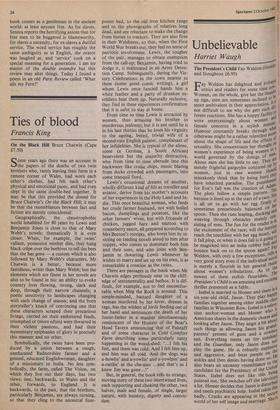Ties of blood
Francis King
On the Black Hill Bruce Chatwin (Cape £7.50) Some years ago there was an account in the papers of the deaths of two twin brothers who, rarely leaving their farm in a remote corner of Wales, had worn each other's clothes, had felt each other's physical and emotional pains, and had even slept in the same double-bed together. It may be that this provided the donne for Bruce Chatwin's On the Black Hill; it may be that the resemblances between fact and fiction are merely coincidental.
Geographically, the claustrophobic world inhabited for 80 years by Lewis and Benjamin Jones is close to that of Mary Webb's novels; thematically it is even closer. When, for example, the twins' valiant, possessive mother dies, they hang black crepe over the beehives to tell the bees that she has gone — a custom which is also followed by Mary Webb's characters. Mr. Chatwin is a better, because more fastidious, writer than Mary Webb; but the elements which are finest in her novels are also to be found in his: an ability to evoke country lives flowing, strong, dark and deep, through their narrow channels; a poetic sensitivity to landscapes changing with each change of season; and the born storyteller's knack of convincing one that these characters scraped their precarious livings, carried on their embittered feuds, triumphed or (more often) were thwarted in their violent passions, and had their momentary epiphanies of glory in precisely this manner and no other.
Symbolically, the twins have been pro- duced by a union between a rough, uneducated Radnorshire farmer and a genteel, educated Englishwoman, daughter of a missionary to India. No less sym- bolically, the farm, called The Vision, on which they live out their days, has two views: one, backwards, to Wales and the other, forwards, to England. It is backwards, to the past, that the brothers, particularly Benjamin, are always turning, so that they cling to the ancestral four-
poster bed, to the old iron kitchen range and to the photographs of relatives long dead, and are reluctant to make the change from horses to tractors. They are also firm in their Welshness, so that, when the First World War breaks out, they feel no sense of patricitic involvement. Lewis, the tougher of the pair, manages to obtain exemption from the call-up; Benjamin, having tried to dodge it, is maltreated in an Army Deten- tion Camp. Subsequently, during the Vic- tory Celebrations in the town nearest to them (some good comic writing), a girl whom Lewis once fancied hands him a white feather and a party of drunken ex- soldiers beat them up. Naturally reclusive, they find in these experiences confirmation that it is safer to stay at home.
From time to time Lewis is attracted by women, thus arousing his brother to murderous jealousy; but it is not until he is in his late thirties that he loses his virginity to the ageing, bored, trivial wife of a second-rate English painter, complaisant of her infidelities. She is typical of the aliens, some (a German, a South African) benevolent but the majority destructive, who from time to time obtrude into this backwater like cruise ships, music blaring from decks crowded with passengers, into some tranquil fiord.
Lewis's occasional dreams of another, wholly different kind of life as traveller and aviator, derive from his mother's accounts of her experiences in the Holy Land and In- dia. This once beautiful woman, who feeds her crude farmer husband, not with boiled bacon, dumplings and potatoes, like the other farmers' wives, but with fricassee of chicken, jugged hare and mutton with rowanberry sauce, all prepared according to Mrs Beeton's receipts, who bores him by in- sisting on reading novels aloud to him after supper, who comes to dominate both him and their sons, and who joins with Ben- jamin in thwarting Lewis whenever he wishes to marry and set up on his own, is as remarkable a creation as the twins.
There are passages in the book when Mr Chatwin edges perilously near to the cliff- edge of sentimentality and bathos. It is dif- ficult, for example, not to feel uncomfor- table when Meg the Rock is around. This simple-minded, bastard daughter of a woman murdered by her lover, dresses in rags, has the wildest of birds feeding out of her hand and announces the death of her foster-father in a manner simultaneously reminiscent of the Hostess of the Boar's Head Tavern announcing that of Falstaff and of some character in Cold Comfort Farm describing some particularly nasty happening in the wood-shed: '...I felt his feet, and them was cold. And I felt him up, and him was all cold. And the dogs was a-howlin' and a-yowlin' and a-yowlpin' and a-rattlin' at the che-ains ...and that's as I knew Jim was gone...!'
But, in general, the book tells its strange, moving story of these two intertwined lives, each supporting and choking the other, two halves, male and female, of single, larger nature, with honesty, dignity and convic- tion.






































 Previous page
Previous page